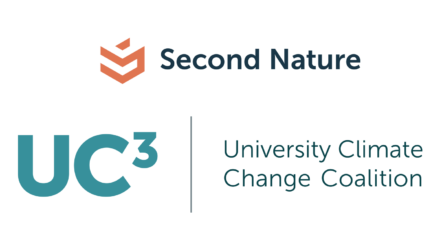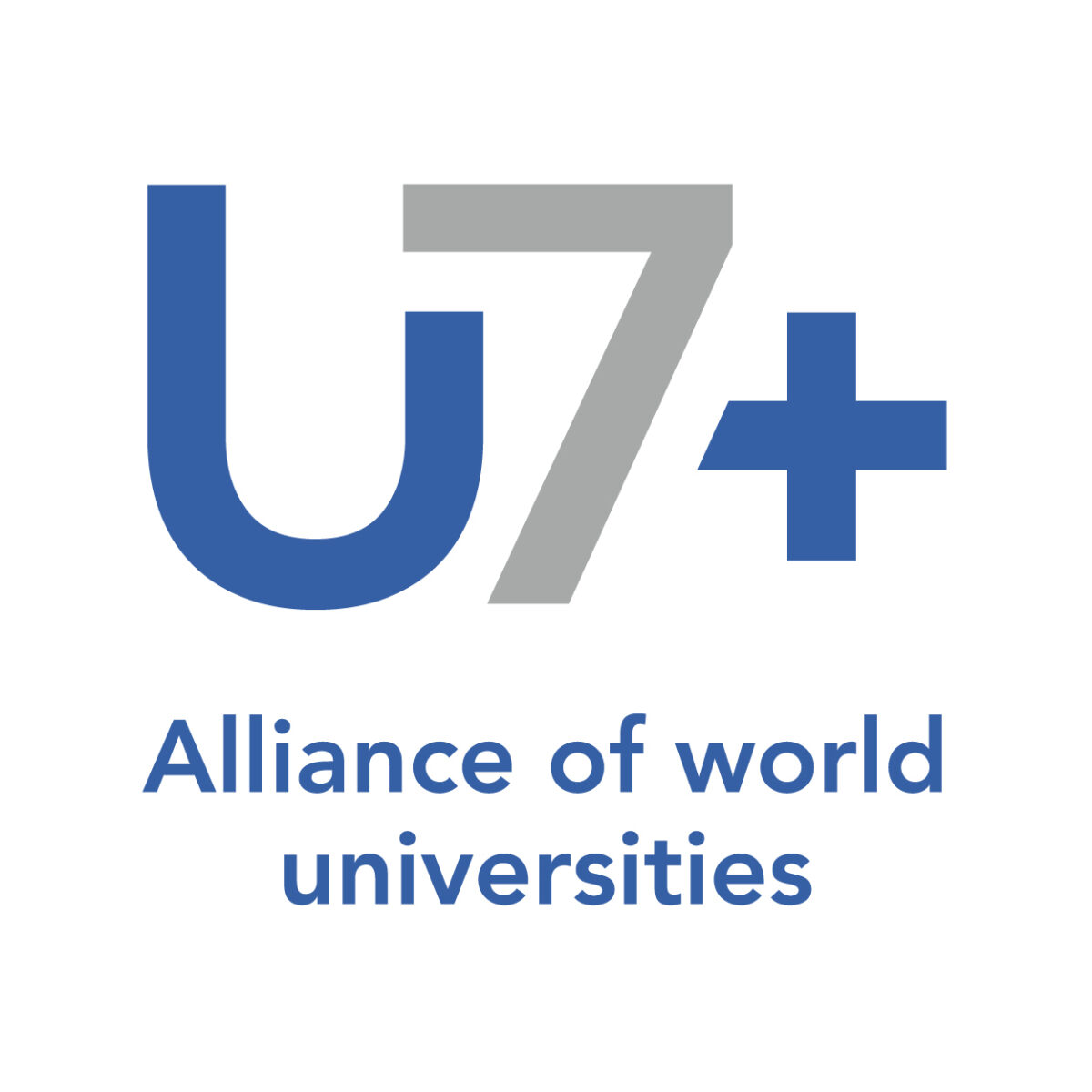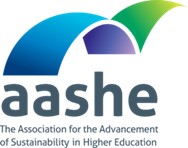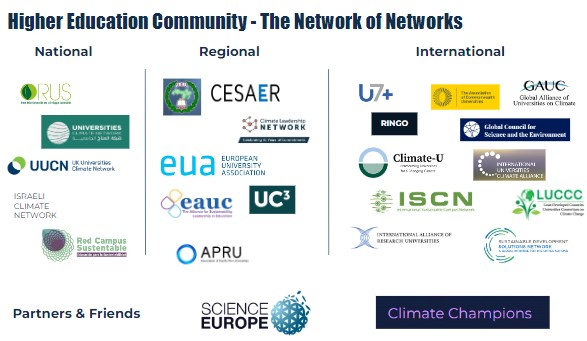The University of Toronto is an active member and plays a leadership role in a number of international higher education networks as part of its commitment to being an active agent of change in society. Participation in these networks enables the sharing of best practices, collaborative learning, and networking for sustainability champions working across institutions.
University Climate Change Coalition (UC3)

The University Climate Change Coalition (UC3) was established in 2017 to mobilize university resources and expertise in North America to accelerate local and regional climate action in partnership with businesses, cities and states, foundations, and other organizations. U of T was one of the inaugural members, and since 2017 the network has grown to 23 members: 4 Canadian, 2 Mexican, and 17 American.
U of T has been actively involved in UC3 and in 2021 we strengthened our leadership in the coalition with the addition of John Robinson, CECCS Co-Chair, on the UC3 steering committee. Based on lessons learned over the past two years from cross-sector forums, internal collaborations, webinars, and partnerships with local and regional stakeholders, UC3 has developed a Strategic Plan, which outlines 5 core values, 3 goals and 15 strategies aimed at campus, community and global engagement of member universities on climate action.
The three goals are:
- Leverage university resources to accelerate and promote climate action research, teaching and/or co curricular activities on campus Sphere of Influence: Community
- Foster and strengthen cross-sector partnerships in community to cocreate place-based climate action solutions that reduce GHG emissions and build community resilience Sphere of Influence: Global
- As an international coalition, elevate and amplify research universities’ leadership role in accelerating global climate action and transitioning to a more resilient, low-carbon future
U of T is engaged in ongoing UC3 initiatives on transdisciplinary training for emerging scholars and urban research co-production workshops, and is part of the Urban Climate Action Project of university-city partnerships on climate action and cross-sector collaboration in Toronto.
In 2023, UC3 launched a Research Working Group to convene researchers across North America to scale and build capacity for transdisciplinary co-production (TDCP) of climate change and sustainability research with non-academic partners. This initiative is being led by the University of Toronto with administrative support from Second Nature, with the workshops modelled after the TDCP pilot workshop delivered first at U of T.
Learn more about the University Climate Change Coalition here.
U7+ Alliance

The U7+ Alliance is an international alliance of universities, whose presidents meet annually to both share best practices and commit to concrete action by addressing the most pressing global challenges. Membership in the Alliance includes over 55 universities from both G7 nations as well as a number of universities from the global south. The Alliance has a strong track record of engaging with and informing G7 commitments, as well as engaging with other multilateral bodies, including an ongoing presence at the UNFCCC Framework Convention on Climate Change meetings (COP).
The U7+ was founded in 2019 under the high patronage of French president Emmanuel Macron with the goal of establishing a high level, transnational academic partner to the G7. The founding document of the U7+ Alliance sets out several specific areas where universities can and do play a substantive role in addressing global challenges, including climate change and sustainability. Recognizing the urgency of the climate crisis, the U7+ delivered a Statement on Climate Change & Sustainability to the G7 in October 2021.
The University of Toronto has played a leadership role in the Alliance’s work on climate change and sustainability, co-chairing a working group with the University of Edinburgh and Paris Sciences et Lettres (PSL). U of T’s U7+ activities are led by the Office of the Vice-President, International, supported by CECCS. CECCS co-led two workshops in 2021, contributed to U7+ side-events COP26 (Glasgow), COP27 (Sharm el Sheikh) and COP28 (Dubai), and has supported student engagement in Alliance activities.
Learn more about the U7+ Alliance here.
Sustainable Development Solutions Network (SDSN) Canada
SDSN Canada is a network based at the University of Calgary to unite Canada’s academic community around the SDGs. U of T’s membership in the SDSN is represented by OISE. The SDSN was launched in 2012 under the auspices of the UN Secretary-General with the mission to promote integrated approaches to implement the SDGs and the Paris Agreement on Climate Change through education, research, policy analysis, and global cooperation.
The SDSN adopted the SDGs and quickly grew, founding its global networks program, which is a membership-based alliance of top-tier knowledge-generating institutions focused on sustainable development, organized in national and regional clusters. As of 2022, the SDSN has over 1,600 members in 47 networks across 137 countries.
In 2019, the SDSN published a new framework to mobilize transformative efforts towards the SDGs. The Six Transformations Framework now informs their global strategy.
With commitments to the SDGs made by nation states, universities, private business, and civil society, SDSN’s research and policy analysis work is helping promote solutions to realize the goals.
International Sustainable Campus Network (ISCN)

The International Sustainable Campus Network’s mission is to provide an international forum to support higher education institutions in the exchange of information, ideas, and best practices for achieving sustainable campus operations and integrating sustainability in research and teaching. The University of Toronto became an ISCN member in early 2022 and is represented in the ISCN Advisory Committee and group of Senior Fellows by CECCS Director Kristy Faccer. There are currently 91 member universities in 30 countries and the ISCN is headquartered at EPF Lausanne.
Association for the Advancement of Sustainability in Higher Education (AASHE)

AASHE is a network of over 900 members across 48 U.S. states, 1 U.S. Territory, 9 Canadian provinces and 20 countries, serving a full range of higher education faculty, administrators, staff and students who are change agents and drivers of sustainability innovation. They develop and host various initiatives for best practice sharing, professional development and networking for sustainability professionals and champions in higher education.
Its Sustainability Tracking, Assessment, and Rating (STARS) is a self-reporting framework for colleges and universities to measure their sustainability performance. The University of Toronto Mississauga (UTM) earned a STARS gold rating in 2024.
Network of Networks (NoN)
The network of networks (NoN) was created to build and improve connectivity among Higher Education Institution (HEI) climate networks towards accelerated climate action locally and globally.
The idea of a NoN was presented by CECCS Co-Chair John Robinson at a meeting on February 21, 2022 convened by COP26 President Alok Sharma in partnership with the UK COP26 Universities Network (today known as the UK Universities Climate Network), and the International Sustainable Campus Network (ISCN).
Since this time, CECCS Director Kristy Faccer and Steve Davison, Director of Strategy for Cambridge Zero at the University of Cambridge, have co-convened the NoN through community building and consultation, and helped to advance key priorities outlined by network leads. To date, NoN activities have included a network mapping and survey project, the development of a sector-wide vision and a flagship partnership with the UN Climate Champions as well as several roundtables, panel discussions and other events. Each year, the NoN works with networks in its community to align activities at major UN Climate events, such as the annual Conference of the Parties (COP), Subsidiary Bodies meetings and select Climate weeks.
The NoN is in active conversation with a number of groups around the world, including those indicated below.

For more information about the NoN, please contact ceccs@utoronto.ca.
